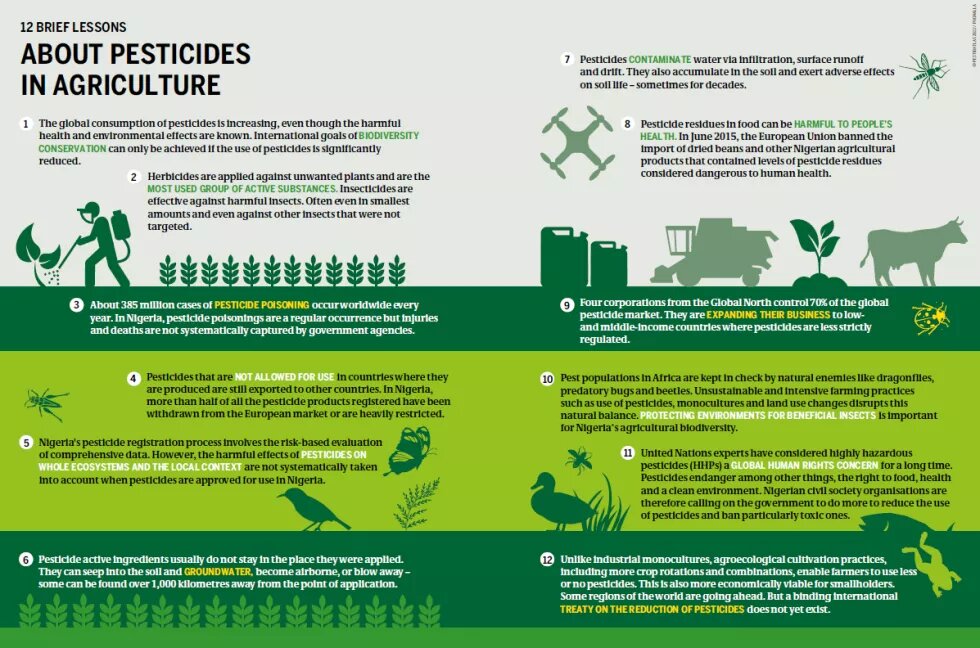More and more highly toxic pesticides are being used in agriculture worldwide, although the consequences for our ecosystem are serious.

1: The global consumption of pesticides is increasing, even though the health and ecological consequences have long been known. International goals of BIODIVERSITY CONSERVATION can only be achieved if the use of pesticides is significantly reduced
2: Herbicides are applied against unwanted plants and are the MOST USED GROUP OF ACTIVE SUBSTANCES. Insecticides are effective against insects. Often even in smallest amounts and even against other insects that were not targeted.
3: About 385 million cases of PESTICIDE POISONING occur worldwide every year. People in the Global South working in rural areas are particularly affected.
4: Pesticides that are NOT ALLOWED FOR USE in countries where they are produced are still exported to other countries. In Nigeria, more than half of all the pesticide products registered have been withdrawn from the European market or are heavily restricted.
5: Nigeria's pesticide registration process involves the risk-based evaluation of comprehensive data. However, the harmful effects of PESTICIDES ON WHOLE ECOSYSTEMS AND THE LOCAL CONTEXT are not systematically taken into account when pesticides are approved for use in Nigeria.
6: Pesticide active ingredients usually do not stay in the place they were applied. They can seep into the soil and GROUNDWATER, become airborne, or blow away – some can be found over 1,000 kilometres away.
7: Pesticides CONTAMINATE water via infiltration, surface runoff and drift. They also accumulate in the soil and exert adverse effects on soil life – sometimes for decades.
8: Pesticide residues in food can be HARMFUL TO PEOPLE’S HEALTH. In June 2015, the European Union banned the import of dried beans and other Nigerian agricultural products that contained levels of pesticide residues considered dangerous to human health.
9: Four corporations from the Global North control 70% of the global pesticide market. They are EXPANDING THEIR BUSINESS to low and middle-income countries where pesticides are less strictly regulated.
10: Pest populations in Africa are kept in check by natural enemies like dragonflies, predatory bugs and beetles. Unsustainable and intensive farming practices such as use of pesticides, monocultures and land use changes disrupts this natural balance. PROTECTING ENVIRONMENTS FOR BENEFICIAL INSECTS is important for Nigeria’s agricultural biodiversity.
11: United Nations experts have considered highly hazardous pesticides (HHPs) a GLOBAL HUMAN RIGHTS CONCERN for a long time. Pesticides endanger among other things, the right to food, health and a clean environment. Nigerian civil society organisations are therefore calling on the government to do more to reduce the use
of pesticides and ban particularly toxic ones.
12: Unlike industrial monocultures, agroecological cultivation practices, including more crop rotations and combinations, enable farmers to use less or no pesticides. This is also more economically viable for smallholders. Some regions of the world are going ahead. But a binding international TREATY ON THE REDUCTION OF PESTICIDES does not yet exist.